constellation of coincidences
the web of fateful encounters behind reality
I seem to always get the itch to write to you all once a month. It starts nagging at me that I haven't published anything for a while, that I haven't been able to share what I've been obsessed with lately. It's a relief to have people to listen to these ramblings—the seemingly random string of items that I've plucked from the massive river of information that is life. And while not as straightforward as a traditional essay, I think these snippets somehow feel weightier in a way, fleshier as E describes. With that, I hope you enjoy this string of entries from the past month.
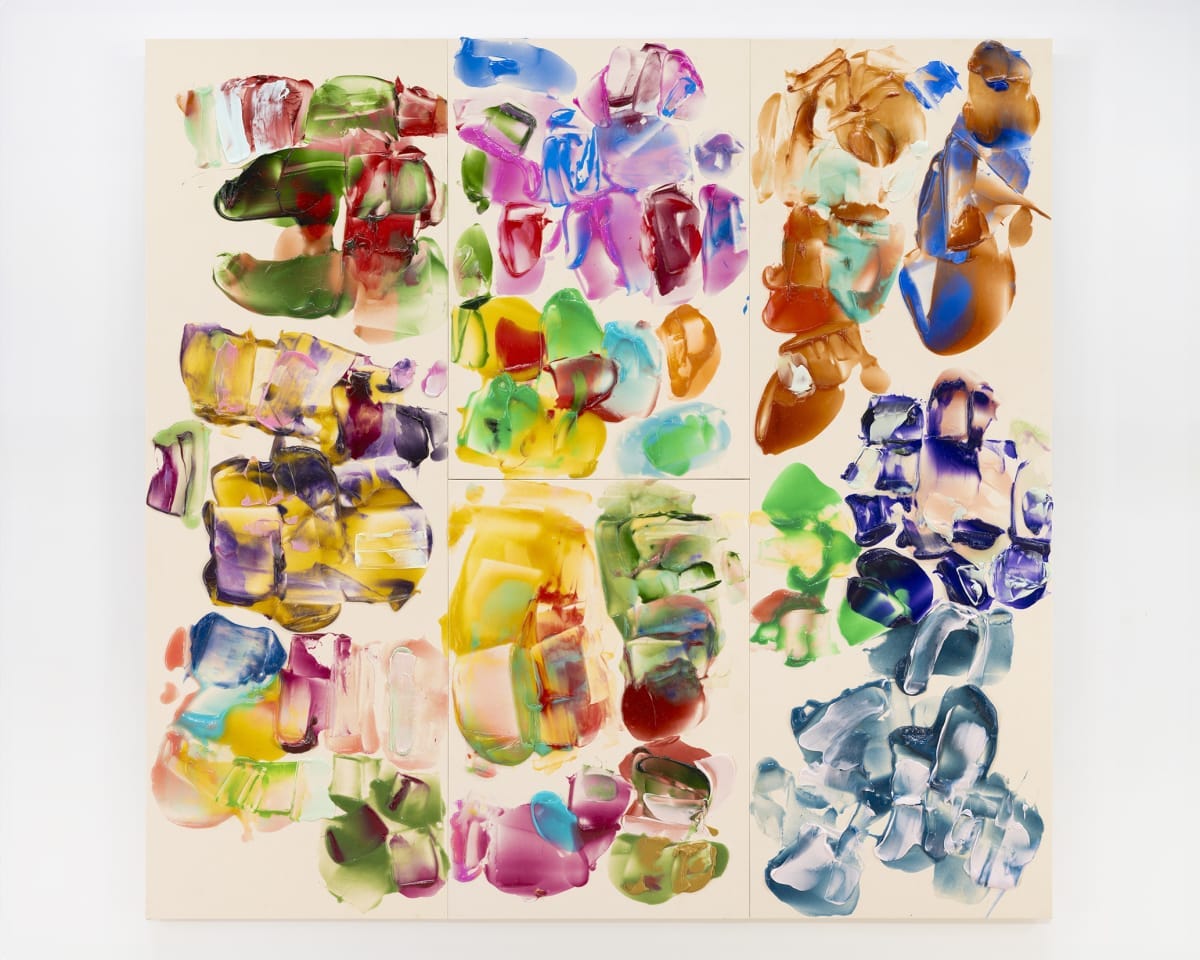
It’s funny how fate works sometimes. It seems the most important things never happen as straightforwardly as you intend them to regardless of how well you plan.
I’m 30 minutes from landing back in San Francisco after four weeks in New York. A few weeks ago, a video popped up on my feed showing a politician speaking earnestly with people on the street. All of sudden he seemed to be everywhere with an electrifying energy and a commitment to making New York more affordable for everybody. I became a little obsessed at the momentum he had rallied behind his cause and spent hours deepdiving into how his presence evolved. Yesterday night, I watched him become the Democratic nominee for Mayor of New York City.
Media sources described him as a danger to the city, the establishment shunned him, and yet this young assemblymember with a radical vision, honest disposition, and earnest past seems poised to be the ultimate decisionmaker behind $10 billion in the city that arguably most represents the entire US. His victory has already set off a wave of global responses that mark an upheaval in the political landscape, seeding the hope for unabashedly progressive and young people to run for office.
Pundits and critics have tried to dissect his success already—his unparalleled fieldwork and social media presence, the diverse coalition that came out, the scandals and negative vision of his rival. But there’s so many people whose names we don’t know who have laid the groundwork for a proud democratic socialist and muslim to be in this position.
I’m reminded of Beto’s run in Texas, close to my home, AOC, Andrew Yang and so many more who have laid the groundwork for us to believe in a politics of dreaming big and delivering for everyone. It remains to be seen if Zohran will make it to City Hall and whether he will deliver on his intentions. But I’m rooting for him and all the people who’ve entrusted their dreams to him when politics has so often felt like it has abandoned us.
Orb is an anime that follows a sequence of protagonists over many decades who are only connected by their fateful encounters with heliocentrism when it was still considered blasphemy by the Catholic Church and propagators were hunted and sentenced to death.
It's a surprising story format when so much of today's popular media focuses on creating singular heroes and villains. The characters are relatable and compelling, but they aren't the main focus. The central protagonist is just the idea—a blasphemous and dangerous one that drives people to flip their entire lives, both in service and in opposition to it.
(mild spoilers below)
None of the main protagonists we see manage to bring heliocentrism to life, and most of their main efforts from the proofs to the political pathmaking don't last the test of time. The only trace that lasts is the rumor of a book talking about the idea. A university student overhears the title which stays with him until he writes a commentary about the idea as a professor 20 years later. A student named Copernicus reads this commentary a decade later, and you know the rest.
None of Orb's protagonists are in the history books, but they represent all the people that made the breakthrough possible by setting the foundation decades before. I wonder about all the unknown contributors to most of the magical innovations that we take for granted today—the internet, airplanes, microwaves. I wonder how many of them dreamed about becoming "the one" to break through and how they felt when they didn't quite make it. Would they feel satisfied seeing the future now?
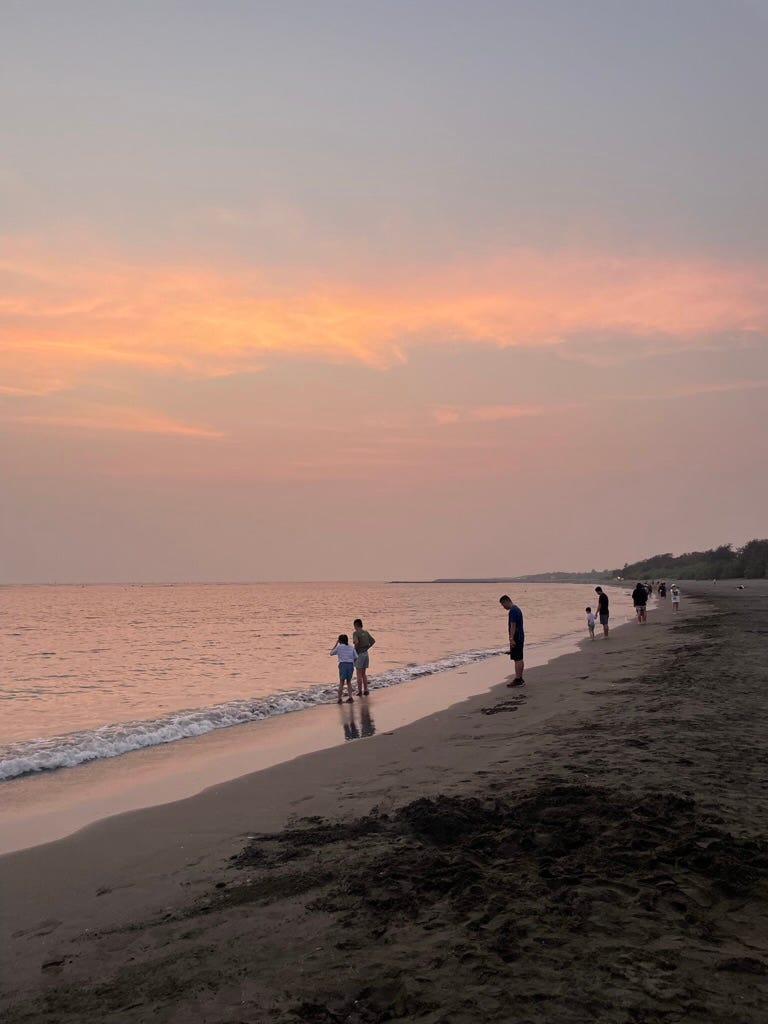
Taiwan Travelogue by Yáng Shuang-zi and translated from Mandarin by Lin King is a novel about a Japanese novelist, her Taiwanese interpreter, and the book the former dedicates to the latter. The entire book is designed to be the novel that the novelist, Aoyama Chizuko, wrote about her time in Taiwan, and it's only through a series of unlikely events that it is published. In a series of letters at the end of the book, it shows how the publication takes place: Chizuko publishes the original in Japan with a dream of it reaching the interpreter. The novelist's daughter spends her life searching until she finally finds the interpreter in Austin, TX and convinces her to do the first Mandarin Chinese translation. The real author of the book, Shuang-zi, writes about how the new Mandarin Chinese edition is realized in the 21st century, finding snippets of mentions of Chizuko, which leads her to doing special research to creating the book. Finally, the translator, King, writes "a Taiwanese translator, while bringing the book to the ultimate colonial language of English, has struggled to determine how the Japanese colonial government would have pronounced Taiwanese terms and therefore consulted the Japanese translation of a Taiwanese novel that claims to be a Taiwanese translation of a Japanese novel."
Chizuko is a fictional character, but the series of coincidences that led to the book being published feel real. And it's incredible to me how many stories are wrapped up in this "one" story, how efforts to reproduce (translation) lead to the creation of unexpected side-effects, how so many things that appear "flat" have so many layers to unravel. Reality has a surprising amount of detail, and the web of details grows larger every moment.
At the pottery studio the other night, I recognized a face. I don't remember their name because we never really talked, but I remember they were at the same dorm in college. It was a face I recognized from long nights working in the dining hall. I felt a shockwave of surprise, both seeing someone from a past life, almost 7 years ago, and at the fact that I even recognized them despite how long had passed.
The environment was different—a cold, foggy night in San Francisco compared to the warm and humid evenings of Houston—but it felt fitting that we encountered each other again in the same circumstances, working late at night in a shared space.
I didn't say hi because there was nothing to say, but I silently wished them well on the pieces they were glazing and let myself feel comforted by the smallness of the world. I cherish this feeling whenever it shows up because I know it will soon fade. It's intimate and comforting yet bittersweet, like sharing an inside joke with the universe, one in a series of grand bits we commit to in the thing we call life.
I think a lot about coincidences, chance encounters, and fateful moments, how they always seem to feel more intentional than coincidental. Like the things that you feel need to happen do happen in some way or another, given enough time and enough chances.
I find myself circling around this question over and over throughout my life. In 2020, I wrote about dilution, an unsatisfactory metaphor for this feeling of constant osmosis between each other and the world. I found myself searching for it again in interconnected systems and relationships in my word of 2022 and the objects I held onto from a big move. This year I dove into the topic while teaching Gift Interfaces with Elan and found myself obsessed with the coincidences that gifts are built on and celebrate and how some of the greatest gifts are the space those coincidences to happen in the first place (Elan and I meeting and teaching the class even feel a bit like a magical coincidence).
These constellations of coincidences are collaborative works, a partnership between people and the world. Our hopes, dreams, and longings crystallized in fragments of light in other people's timelines. A single point becomes a line becomes a star becomes a leaf becomes a tree becomes a root system that fills the sky. I'm not sure what point I'm at in my various storylines, but I hope I can look up one day and marvel at all the galaxies we've made.
Updates
I'll be sharing a new interactive work with Alserkal Avenue, a Dubai-based arts organization, starting August 15. Check out their Instagram to participate :)
I'm among the local artists who received a grant from the San Francisco Arts Commission this year to support Computing Shrines. Stay tuned :)
I made a video of the magical moment 300+ people at the Internet Archive tossed their phones in response to everyday
I ran my first half-marathon at 6:30am on Sunday in SF. It’s the first physical goal I’ve had in a long time, and I’m proud to finally be proud of something that is completely unrelated to my creative practice :)
This dispatch was sent to 1612 inboxes. My writing is always free and open, but I am independently funded and appreciate any support you can offer. Consider sharing this with a friend and becoming a patron (or for those without Github, subscribing on Substack) for the warm & fuzzy feeling of supporting an indie artist (and access to the community & works-in-progress) .
Thank you to the 27 people who supported my independent work _with a sponsorship last month, and a warm welcome to Jamie, Raymond, and Michael.
I recently learned of Kenjiro Okazaki’s work on encountering his show in Tokyo at the Museum of Contemporary Art and was stopped in my tracks by his practice. And I love how his artwork titles are entire poems and essays. It’s so absurd.


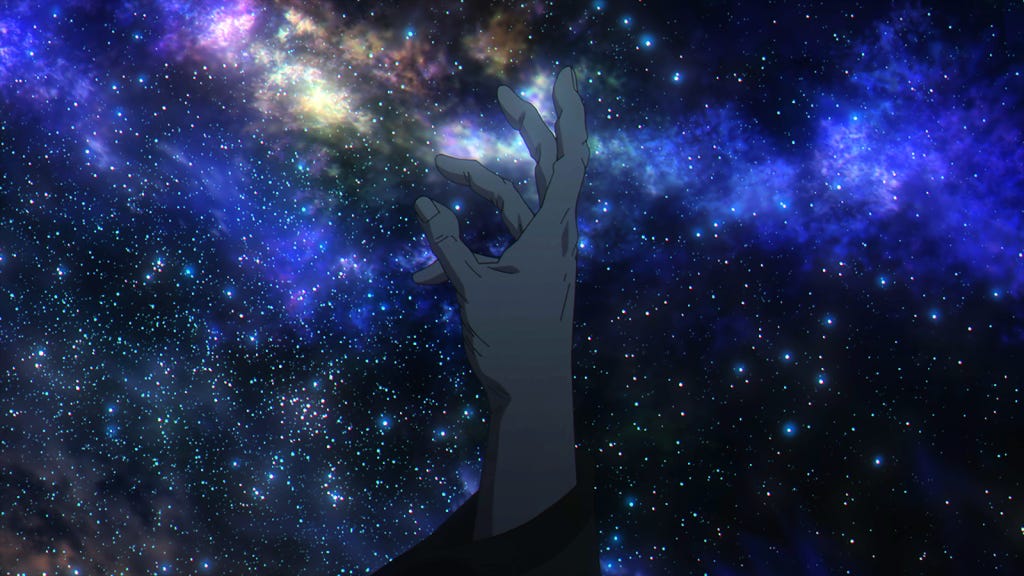
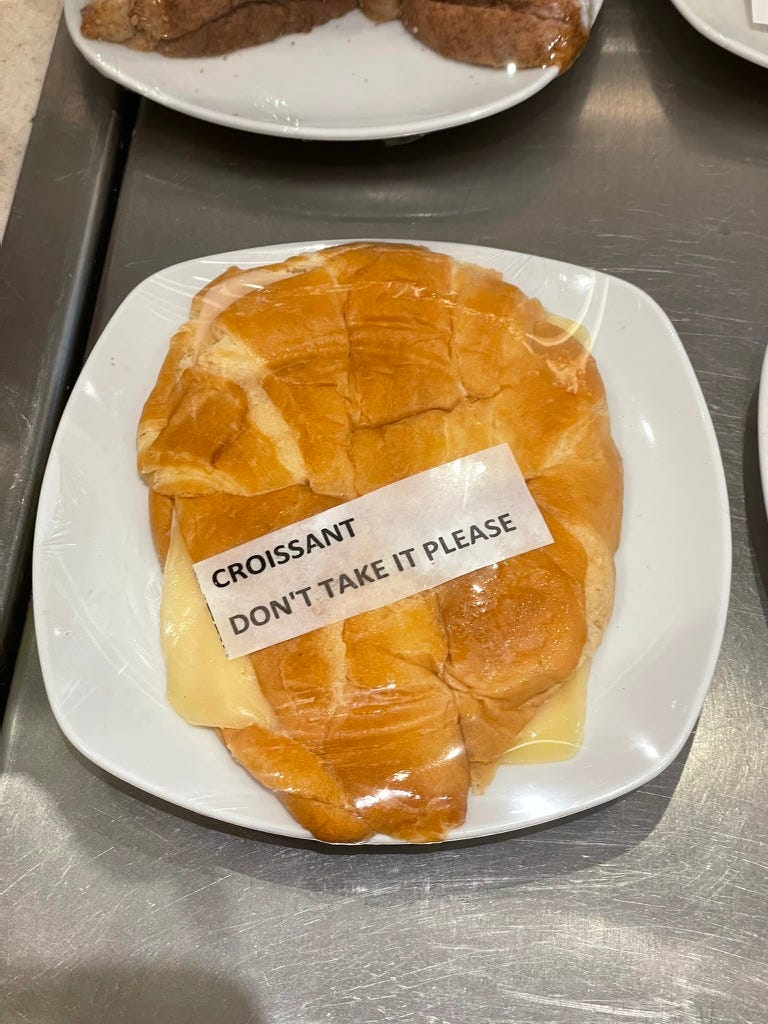
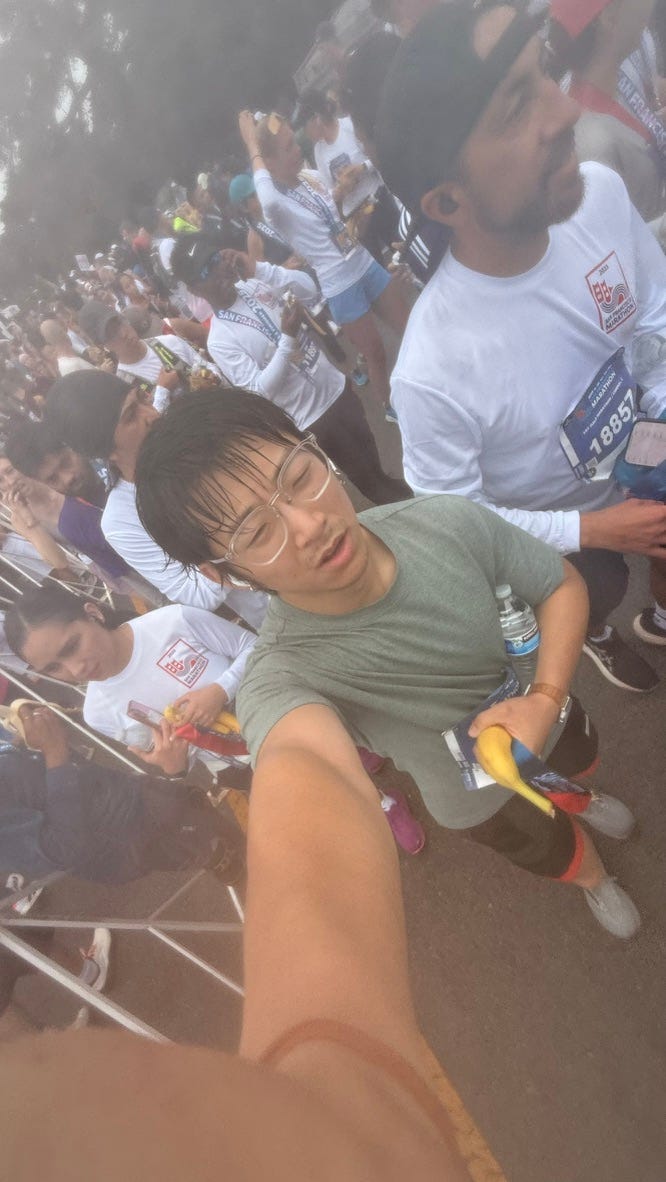
Love the variance in scale from little to large ideas, and everyday to high-effort events. It creates a sense of familiarity and sonder in with the "telescope effect", where after seeing fine details once makes them feel present even after zooming out beyond the point where you can see any details at all. Very engaging read.
orb mentioned